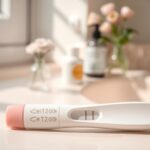Getting pregnant is both exciting and challenging. This article offers expert tips to boost your chances of conception. We’ll cover understanding your menstrual cycle, making lifestyle changes, and optimizing fertility. Whether you’re just starting or have been trying for a while, this guide will help you.
But first, let’s talk about a common worry: Could a previous miscarriage septic affect your chances of getting pregnant again? Many couples wonder about this. We’ll explore this topic to help you feel more prepared for a successful pregnancy.
Key Takeaways
- Understanding your menstrual cycle and ovulation is crucial for timing intercourse
- Lifestyle factors like weight, smoking, and stress can impact fertility
- Timing intercourse during the fertile window is key for conception
- Male fertility plays a significant role in the success of getting pregnant
- Seeking medical advice and taking supplements like folic acid can improve pregnancy health
Understanding Your Cycle and Ovulation after miscarriage septic
To get pregnant, you need to know your menstrual cycle and ovulation. Your cycle is usually 28 to 35 days long. Ovulation happens between days 11 and 21. Women have about 1 million to 2 million eggs, but only 300 to 400 are released in their lifetime.
Tracking Your Menstrual Cycle
It’s important to track your menstrual cycle. This helps you find your most fertile days. The best time for pregnancy is 1-2 days before ovulation.
Signs of Ovulation
Knowing the signs of ovulation helps you plan better. Look for clear, slippery cervical mucus around ovulation. Your basal body temperature might also go up a bit after ovulation.
Using Ovulation Predictor Kits
Ovulation predictor kits are very helpful. They detect the LH surge that signals ovulation, about 36 hours before. These kits help you know when you’re most fertile.
| Fertility Tracking Method | Effectiveness |
|---|---|
| Menstrual Cycle Tracking | Moderately Effective |
| Ovulation Signs (Cervical Mucus, Temperature) | Highly Effective |
| Ovulation Predictor Kits | Very Highly Effective |
By tracking your cycle, recognizing ovulation signs, and using kits, you can increase your chances of getting pregnant.
Optimizing Fertility through Lifestyle Changes
Making lifestyle changes can boost your chances of getting pregnant. This includes keeping a healthy weight and managing stress. These steps help create the best conditions for conception.
Achieving a Healthy Weight
Having a healthy weight is key for fertility. Being too heavy or too light can mess with ovulation. Being too underweight or overweight can affect fertility by hindering ovulation and regular cycles. Eating well and exercising can help you reach a healthy weight, improving your chances of conception.
Stopping Smoking and Limiting Alcohol
Smoking can lower fertility in women by aging ovaries early and reducing egg supply. Quitting can boost fertility by 13%. Also, heavy drinking can increase the risk of ovulation problems when trying to conceive. It’s important to drink less for better fertility.
Managing Stress Levels
High stress can harm fertility. Too much exercise, like running, can affect ovulation and lower progesterone levels in healthy-weight individuals. Stress management, like meditation or yoga, can help make conception easier.
| Lifestyle Factor | Impact on Fertility |
|---|---|
| Weight Management | Extremes in weight can disrupt ovulation and conception |
| Smoking Cessation | Smoking is linked to lower fertility in females, aging the ovaries prematurely and depleting the egg supply |
| Alcohol Consumption | Heavy drinking is associated with a higher risk of ovulation problems when trying to conceive |
| Stress Management | Excessive hard exercise can impact ovulation and reduce progesterone levels |
Timing Intercourse for Conception
When you’re trying to get pregnant, timing is everything. The fertile window, which is 3-5 days before and including ovulation, is your best chance. Try to have sex every day or every other day during this time to boost your chances.
Having Sex During the Fertile Window
Conception usually happens 12 to 24 hours after ovulation. The egg is released from the ovary then.
Sperm can live up to 5 days inside a woman’s body. This is a key fact in understanding how long sperm can survive after ejaculation. It shows how important timing is in fertility and conception. So, having sex before ovulation increases your chances of getting pregnant.
Frequency of Intercourse
Having sex often during the fertile window is good, but don’t overdo it. Too much can lower sperm count and quality. Aim for sex every 1-2 days during the fertile window. This balance will help you get pregnant faster.
| Statistic | Value |
|---|---|
| Conception occurs 12 to 24 hours after ovulation | – |
| Conception only happens 25% to 30% of the time. | – |
| The best times to have sex for conception are in the three days before ovulation or within 24 hours of ovulating | – |
| The fertility window is approximately 6 days each cycle, as sperm can live in a woman’s body for up to 5 days, while an egg can survive for about 12 to 24 hours after ovulation | – |
Understanding ovulation and the fertile window can help couples conceive faster. Focus on the critical days and find the right balance of sex frequency. This can greatly increase your chances of getting pregnant.
getting pregnant: Importance of Male Fertility
Male fertility is key when trying to conceive. The quality and number of a man’s sperm greatly affect pregnancy chances. Knowing how lifestyle and age impact sperm health is vital for couples.
Lifestyle Factors Affecting Sperm Health
A healthy lifestyle boosts sperm health. Here are important factors to keep in mind:
- Weight Management: Being overweight can lower sperm count and movement.
- Smoking and Alcohol: Both can harm sperm production and sexual function.
- Exposure to Toxins: Pesticides and chemicals can affect fertilizer quality.
- Stress Management: Too much stress can reduce sperm production.
Men can improve their sperm health by changing these lifestyle habits. This can increase their chances of getting a partner pregnant.
| Fertility Metric | Optimal Range | Potential Impact on Fertility |
|---|---|---|
| Sperm Count | At least 15 million per milliliter | Fertility is most likely with a sperm count of at least 15 million per milliliter. |
| Sperm Motility | 40% or more moving | Pregnancy is possible with less than 40% of the sperm moving, but 40% is considered the threshold for optimal motility. |
| Male Age | Under 50 years old | Sperm movement and the number of typical sperm tend to decrease with age, especially after age 50. |
Understanding male fertility and its impact is crucial. By improving lifestyle habits, couples can boost their chances of conceiving. This confidence can start their journey to parenthood.
Role of Age in Fertility
Age is key when it comes to fertility. As people get older, especially women, their eggs quality and number go down. This makes it harder to get pregnant naturally. Even though some people can have kids in their 40s and 50s, the chance of getting pregnant drops a lot after 35 for women and 50 for men.
Research shows that younger individuals usually want to have kids more and have a positive view of it. For example, a study on academics found that younger academics know more about fertility and want kids more than older ones.
But, this knowledge gap is not just for academics. Students in places like Finland, the United States, Denmark, Portugal, and Sweden also show mixed levels of fertility knowledge and attitudes towards having kids. This means there might be a lack of understanding about how age affects fertility.
| Country | Findings |
|---|---|
| Finland | University students showed a certain level of awareness about the impact of age on female fertility. |
| United States | Undergraduate students displayed varying levels of fertility awareness and parenting attitudes. |
| Denmark | University college students showcased diverse fertility awareness and attitudes towards parenthood. |
| Portugal | Both women and men might not be well-informed about fertility, raising concerns about childbearing intentions and knowledge gaps. |
| Sweden | Female university students showed mixed attitudes towards future motherhood and varied understandings about fertility. |
The effect of age on fertility is something to think about for those planning to have kids. Knowing this can help them plan their family better and seek help if needed.
Preconception Planning and Preparation
Planning and preparing for a baby is key for couples. It’s smart to see a doctor before trying to conceive. They can check for health issues and talk about lifestyle changes or medication needs. Taking folic acid daily for a month before trying can also help prevent birth defects.
By taking these steps, you’re setting up a healthy start for your pregnancy.
Seeking Medical Advice
Seeing a doctor before trying to conceive is very important. They will look at your health history and discuss any current conditions. They can also give advice on how to improve your fertility and health.
This might include changing medications or managing chronic illnesses. It’s all about getting ready for a healthy baby.
Taking Folic Acid Supplements
- Folic acid is crucial for preventing birth defects of the brain and spine.
- It’s advised to take 400 micrograms (mcg) of folic acid daily, starting a month before trying to conceive.
- Those at higher risk may need 4,000 mcg per day.
By focusing on preconception planning and taking steps like getting medical advice and taking folic acid, you’re setting a strong foundation for a healthy pregnancy and baby.
Exercise and Its Impact on Fertility
Exercise is key when trying to conceive. A moderate workout routine can help, but finding the right balance is important. Too much exercise can mess with ovulation and menstrual cycles.
Research shows that overweight and obese women with polycystic ovary syndrome should do vigorous aerobic exercise or resistance training to improve their chances of conception. But for women trying other fertility treatments, exercise might not help much.
For women who are healthy and trying to conceive, too much vigorous exercise can be bad. A study found that 58% of runners had menstrual cycle problems compared to 9% of women who didn’t exercise. Runners also had lower estrone glucuronide levels, which is bad for follicular maturation.
The best exercise for women planning to get pregnant is at least 150 minutes of moderate physical activity per week, or 30 minutes a day, 5 days a week. Keeping track of your menstrual cycle and adjusting your workout can help boost your fertility.
| Findings | Details |
|---|---|
| Negative Impact of Exercise on Fertility |
|
| Positive Impact of Exercise on Fertility |
|
In summary, exercise and fertility are closely linked, but finding the right balance is key. Moderate exercise is good, but too much can hurt ovulation and fertility. Talking to a healthcare professional can help you create an exercise plan that supports your physical activity and fertility goals.
Myths and Facts About Conception
Trying to conceive can be both exciting and challenging for many couples. It’s key to know the facts from myths to use the best strategies. Contrary to what many believe, certain sex positions or lying still after sex don’t boost your chances of getting pregnant.
Positions During Intercourse
Many think that some sex positions, like missionary or doggy style, help more with conception. But, the position of intercourse has no bearing on the likelihood of conception. What really matters is timing sex during the fertile window, when the egg is ready for fertilization.
Lying Still After Sex
Another myth is that a woman should stay lying down after sex to get pregnant. But, studies have shown that this practice does not affect the outcome of conception. Sperm can reach the egg no matter a woman’s position or movement after sex.
The best way to boost fertility is to understand your menstrual cycle, track ovulation, and keep the egg and sperm healthy. By using proven methods of conception, you can increase your chances of starting a family. This way, you avoid myths that don’t help.
| Myth | Fact |
|---|---|
| Specific sex positions improve fertility | The position of intercourse does not affect the likelihood of conception |
| Lying still after sex increases the chances of pregnancy | Remaining in a specific position after sex does not improve the chances of conception |
When to Seek Fertility Treatment
Fertility challenges can be tough and emotional for many couples. If you’ve been trying to conceive for a year or more (or six months if you’re over 35) without success, it’s time to see a fertility specialist. Both men and women can face infertility, and there are many treatment options based on the cause.
About 10-15% of couples face infertility, and 1 in 8 (12%) in the U.S. struggle with getting pregnant or keeping a pregnancy. A healthcare provider can run tests, find any fertility problems, and suggest treatments like fertility meds, IUI, or IVF. Getting professional help can greatly boost your chances of a successful pregnancy.
Smoking, weight, and certain health issues like endometriosis can affect fertility. Women’s fertility drops significantly after 35, with half the fertility of their early 20s.
Fertility treatments can work, but they also come with risks like multiple pregnancies, premature birth, and birth defects. It’s crucial to talk to your healthcare provider about the risks and benefits of each treatment.
| Fertility Treatment | Description |
|---|---|
| Controlled Ovarian Hyperstimulation (COH) | Involves medications like clomiphene citrate and gonadotropins to help with ovulation. |
| In Vitro Fertilization (IVF) | The most common ART treatment, where eggs and sperm are combined in a lab and then transferred into the uterus. |
| Intracytoplasmic Sperm Injection (ICSI) | Performed when male infertility issues exist, where a single sperm is injected into a mature egg to develop an embryo. |
If you’re facing infertility or thinking about fertility treatment, get help from a qualified healthcare provider. They can offer the support and knowledge you need to move forward and possibly start a family.
Conclusion
Getting pregnant quickly requires a few key steps. First, understand your menstrual cycle. Then, make lifestyle changes to boost your fertility. Time when you have sex is also important. And, don’t forget to address any health issues.
Every person’s path to pregnancy is different. So, be patient and stay hopeful. If you need help, don’t hesitate to ask a doctor.
Unintended pregnancies are common in the U.S. This shows how vital planning and education are. Knowing how to reduce risks can lead to better pregnancy outcomes.
Whether you’re starting or growing your family, this article offers helpful advice. Use these tips to increase your chances of getting pregnant. Welcome a new life with confidence and joy.
FAQ
What are the signs of ovulation?
Signs of ovulation include changes in cervical mucus and basal body temperature. You might also feel midcycle abdominal pain or discomfort.
How soon should you take a pregnancy test after intercourse?
Wait at least 14 days after intercourse before taking a pregnancy test. This allows enough time for the body to produce detectable hCG.
What lifestyle changes can improve fertility?
To improve fertility, maintain a healthy weight and quit smoking. Limit alcohol and manage stress levels.
How often should you have sex to get pregnant?
Have sex every day or every other day during the fertile window. This is the 3-5 days leading up to and including ovulation.
How does a man’s age affect fertility?
As men get older, their sperm quality and amount go down. This can make it harder to have a child. It’s a natural part of aging. This makes conception more challenging, especially after age 50.
What should you do before trying to get pregnant?
Before trying to get pregnant, schedule a preconception checkup. Ensure any medical conditions are controlled. Start taking a daily folic acid supplement.
Is there a link between exercise and fertility?
Moderate exercise can positively impact fertility. However, excessive or strenuous exercise can interfere with ovulation and conception.
Do specific sexual positions or lying still after sex improve the chances of getting pregnant?
There’s no scientific evidence that specific sexual positions or lying still after intercourse improve conception chances. Timing sexual activity during the fertile window and ensuring healthy sperm and egg are key.
When should you seek fertility treatment?
If you’ve been trying to conceive for a year or more (or six months if you’re over 35) without success, seek a fertility specialist. They can help identify and address any fertility issues.












1 thought on “How to Get Pregnant Fast: Tips for Trying to Conceive”